|
|
|
Sort Order |
|
|
|
Items / Page
|
|
|
|
|
|
|
| Srl | Item |
| 1 |
ID:
179367
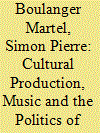

|
|
|
|
|
| Summary/Abstract |
This article investigates the role of cultural production as a practice with important implications for rebel legitimacy. Cultural production is employed to bolster rebel group legitimacy internally, by justifying existing hierarchical relations between the leadership and fighters, and externally by positioning the rebel group as a legitimate alternative to established elites and a rightful representative of the people. Building on a relational approach to armed groups legitimacy, the article analyses cultural production by the Fuerzas Armadas Revolucionarias de Colombia (FARC). The analysis draws on FARC music production from 1988 to 2019, internal documents, artists’ testimonies, and field observations from 2017.
|
|
|
|
|
|
|
|
|
|
|
|
|
|
|
|
| 2 |
ID:
163888
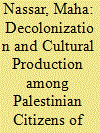

|
|
|
| 3 |
ID:
164818
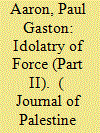

|
|
|
|
|
| Summary/Abstract |
Building on “The Idolatry of Force: How Israel Embraced Targeted Killing,” published in the Autumn 2017 issue of the Journal of Palestine Studies, this companion piece examines the practices through which Israel's garrison state normalizes aggressive militarism and indifference to the pain of others. Political discourse and semantics, media, pedagogical instruction, religious training, and the shared experience of army service all feed into a warrior code and culture where combat and preparations for combat become second nature, and where violence, no matter how extreme and disproportionate, assumes collective legitimacy. A broad rhetorical repertoire is deployed to craft a narrative of virtue, sacrifice, and necessity. Key to this narrative are the threat to national survival posed by demonic enemies and the spiritual valor embodied and replenished in the struggle to vanquish them.
|
|
|
|
|
|
|
|
|
|
|
|
|
|
|
|
| 4 |
ID:
157953
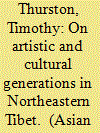

|
|
|
|
|
| Summary/Abstract |
Beginning in the 1980s, and continuing for over three decades since, a particular generation of Tibetans from the Northeastern Tibetan region known as Amdo, and particularly from the northern parts of China’s Qinghai province, has proven extremely productive. Why has this generation, born primarily between 1959 and 1967, been so incredibly successful? This article examines the contextual factors that may have contributed to the incredible success of this generation. This ranges from the policies and circumstances that affected their births, and the state of the cultural field at the time they reached adulthood. Personal experience narratives, autobiographies, and scholarly studies then reveal how this generation was able to access the intellectual field. Finally, I briefly discuss how the Amdo Tibetan intellectual field compares with other Tibetan and ethnic experiences in the People’s Republic of China.
|
|
|
|
|
|
|
|
|
|
|
|
|
|
|
|
| 5 |
ID:
167086
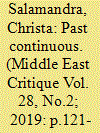

|
|
|
|
|
| Summary/Abstract |
Syria serves as a leading producer of the musalsal [dramatic miniseries], a key Arabic-language mass cultural form. With its dark realism and biting humor, Syrian drama has become a primary mode of sociopolitical commentary for both producers and audiences, given the restrictions on journalistic and academic expression and the absence of participatory politics in most Arab polities. Drama creators deploy a range of temporal strategies to comment on social and political conditions. A reflexive, intertextual chronopolitics runs through serials produced before and during the Syrian conflict that began in 2011. The question ‘what went wrong?’ preoccupies musalsal makers, and their works frequently foreground their belief that Syrian society is ‘going backwards.’ For example, in historical genres of television serials, idealized images harken back to perceived golden ages of cosmopolitanism, throwing the contemporary condition into bitter relief. Makers of dramas set in the present invert this technique, locating the sources of contemporary ills in past mistakes and historical injustices, revealed in flashback, dialogue, and voiceover. Through a technique of narrative allochrony, drama creators also highlight their understanding of modernity’s lapses, depicting select practices, mores, and attitudes as out of sync with what they see as contemporary values. These dramatic depictions of the past and present all point to a failed national project and a derailed modernity. Their creators seek to counter what they deem as a flawed political and social evolution, one that they believe has led to deterioration in the region and a devastating war in Syria.
|
|
|
|
|
|
|
|
|
|
|
|
|
|
|
|
| 6 |
ID:
185873
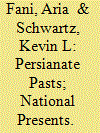

|
|
|
|
|
| Summary/Abstract |
Persianate pasts die hard. Despite the birth of nation-states, advent of colonialism, rise of national literatures, and emergence of new global technologies, the Persianate connections defining the texts, idioms, and vocabularies that bound together large swaths of Islamic Eurasia throughout the early-modern period continued to shape and inflect cultural and literary production in the late-nineteenth and twentieth centuries. If the sixteenth to eighteenth centuries established the high-water mark of Persianate transregionalism, then the following two centuries were defined not so much by the undoing of this world in toto, but by its redeployment, reimagining, and regeneration in new cultural guises and (trans)national contexts. Exchanges across borders and languages helped to articulate new meanings for Persian texts. Educational practices in British India and journalistic ones in Central Asia provided venues for Persianate norms to be preserved, contested, and consecrated. The internationalism of the Soviet East created a new avenue for dynamic conversations about the nature of Persianate heritage and traditions. While new national practices and political ecologies were taking shape across Afghanistan, the Caucasus, Iran, and Central and South Asia, refashionings of Persianate pasts persisted. It is an exploration of such refashionings and the people who participated in them that form the contents of this special issue.
|
|
|
|
|
|
|
|
|
|
|
|
|
|
|
|
| 7 |
ID:
151825
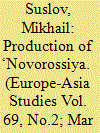

|
|
|
|
|
| Summary/Abstract |
The essay inquires into the cultural production of ‘Novorossiya’ as a politically-coloured territorial ‘brand’, promoted by pro-Kremlin intellectuals, activists of the Donbas rebellion, and internet users. It argues that ‘Novorossiya’ is not only constructed from the building blocks of historical traditions, but also framed by geographical metaphors in popular imagination. Drawing on studies in critical geopolitics and fan fiction, this research interprets ‘Novorossiya’s’ constituency in the Russian-language internet as a sort of political ‘fandom’. Relative to the annexation of Crimea, however, this ‘brand’ has been less successful on the ‘market’ of geopolitical projects.
|
|
|
|
|
|
|
|
|
|
|
|
|
|
|
|
| 8 |
ID:
114957
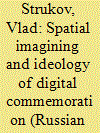

|
|
|
|
|
| Publication |
2012.
|
| Summary/Abstract |
I trace the impact of digital economy on the cultural production on Runet by examining the Russian online gaming industry and focusing on a massively multiplayer online role playing game, Allods Online. I explore the game as a new form of cultural commemoration that goes beyond established discourses of nostalgia, war and trauma. I utilise Henry Lefebvre's concept of the production of space in my examination of the ludic environment of Allods Online as an ideological space. I call for a renegotiation of the Russian mediascape in its post-broadcast phase for it to include new ludic spaces of production of cultural symbols.
|
|
|
|
|
|
|
|
|
|
|
|
|
|
|
|
|
|
|
|
|